The Chuwi AeroBook Review: One Small Step For Chuwi
by Brett Howse on June 21, 2019 8:00 AM ESTSystem Performance
It’s been a long time coming for Chuwi to make the leap from Atom to Core. Intel historically also likes to ensure it has strong product separation in its lineup, so the jump from Atom to Core comes with more performance, but also a sharply higher price. That being said, the latest Gemini Lake based Celerons have made some significant gains, so there is a question of what kind of performance delta there will be between a dual-core Skylake-Y based Core m3 compared to a Goldmont Plus Celeron with four actual cores.
To see how the Chuwi AeroBook performs, it was run through our Laptop workload. For our graphs a variety of devices were chosen to compare it to. The Chuwi LapBook 12.3 is the older Apollo Lake N3450, with four Atom cores from 1.1 to 2.2 GHz. The Chuwi LapBook SE is the latest Gemini Lake N4100, featuring four updated Atom cores from 1.1 to 2.4 GHz. Both of these notebooks cost less. The Microsoft Surface Go features a Y-Series Kaby Lake Pentium 4415Y, but being a Pentium it offers no Turbo at all, so it’s just a 1.6 GHz CPU. The HP Spectre Folio is a Core i7-8500Y, and while being far more expensive, it should show the maximum capabilities of the latest Amber Lake Y Series processor. Finally, the Surface Pro 6 is there to give a reference as to where these fanless devices stack up against a 15-Watt U series Kaby Lake-R with four cores. Once again it’s not direct competition, but was included just to see where these Y series compare against a U series that is also fanless.
PCMark
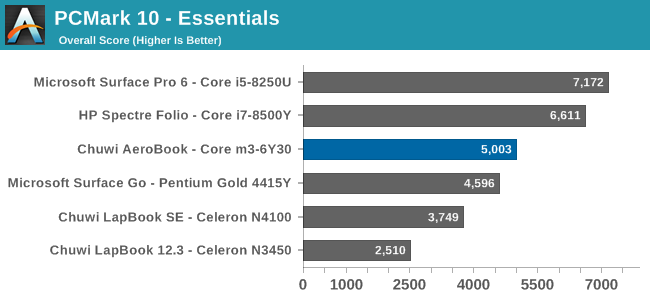
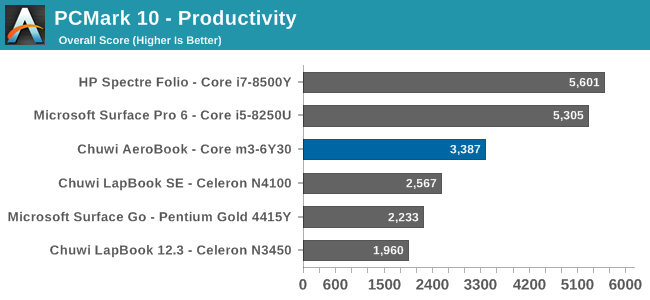
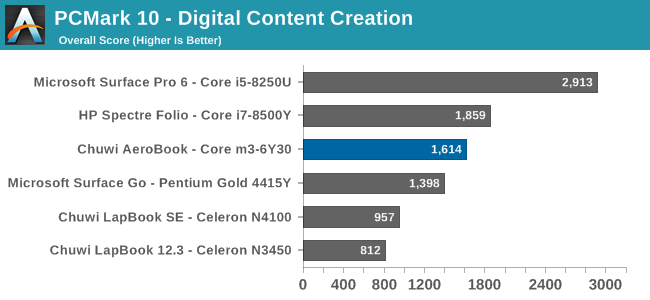
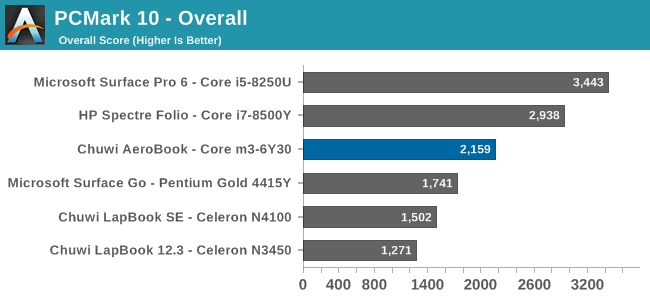
UL’s PCMark suite tests all aspects of a system, with varying workloads depending on the scenario. Some are more stressful on the GPU, such as the Content Creation, and it gives a nice overall look at total system performance including the memory and storage subsystems. There’s no doubt that the move to a Core m3 processor has been a nice bump in performance, easily outclassing the earlier Atom powered Chuwi notebooks. Performance is well off the Amber Lake Spectre Folio though, so while it’s great to see Chuwi move to Core, it would have been nice to see them utilize a more recent version.
Cinebench
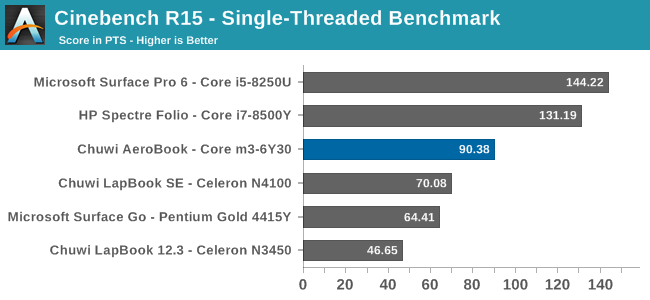
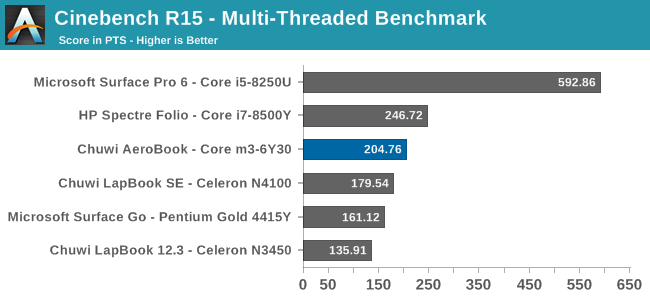
Cinebench is a purely CPU task, and is a great tool because it offers both single-threaded and multi-threaded workloads. The AeroBook once again surpasses the older Atom based Chuwi laptops handily, especially in single-threaded where Core is so much more powerful. On the multi-threaded test the Gemini Lake claws back some of that gap though since it does offer four cores compared to just two on the AeroBook. Four Gemini Lake cores are quicker than two Kaby Lake cores in the Surface Go because the Pentium, despite being a Core architecture, offers no Turbo, but the Core m3 in the AeroBook does offer some boost up to 2.2 GHz and can win the day. However, all of these Y series and Atom powered notebooks are far below the performance of a quad-core U series.
x264
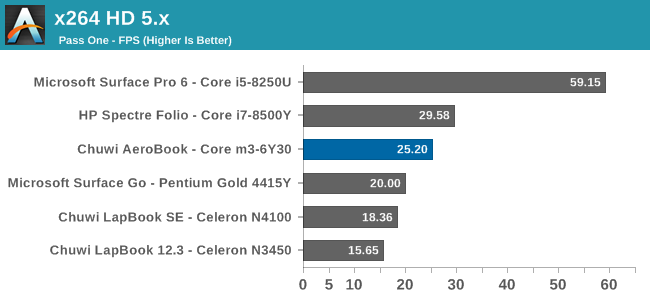
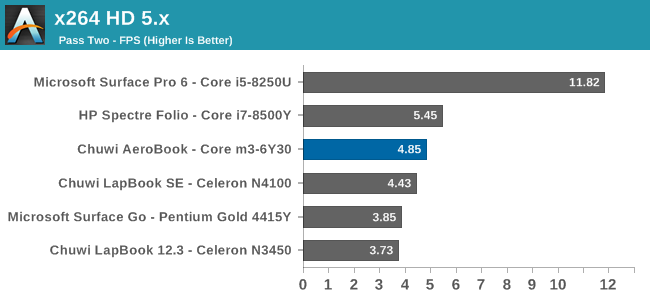
Similar to Cinebench, x264 uses the CPU to encode video and works well with more cores. Once again the Core m3 in the AeroBook offers a nice performance bump over the previous models, but all of these are surpassed dramatically by the Core i5-8250U in the Surface Pro 6.
Web Results
Web workloads tend to be short, and Intel’s aggressive pursuit of ramping up to their maximum Turbo via their Speed Shift mechanism has helped tremendously here. Web is influenced heavily by the browser as well, so for consistency we test with Microsoft Edge. Microsoft is currently migrating away from their EdgeHTML rendering engine to Chromium though, and once they do that we’ll refresh our tests with updated ones.
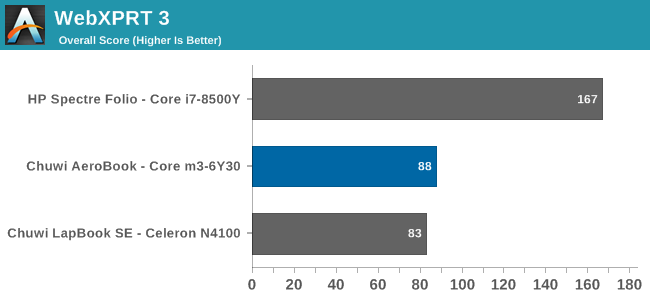
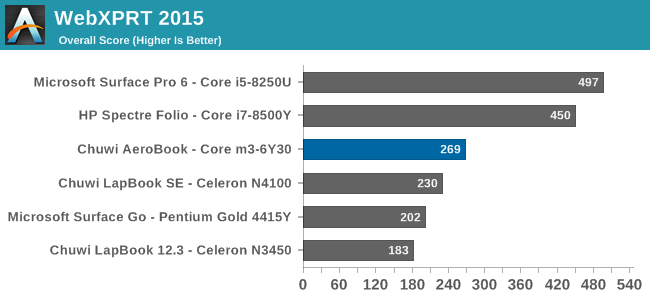
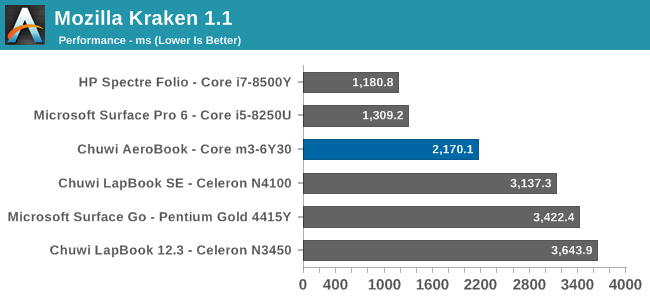
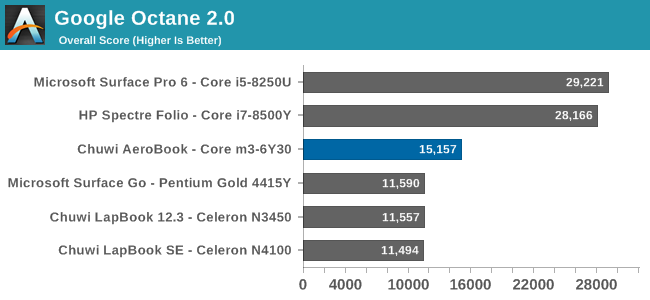
There is a definite gap where the AeroBook slots in. The 2.2 GHz maximum Turbo helps ensure that in light workloads the Core m3 can stay ahead of the Pentium and Celerons, but there’s also a massive gap to the latest Amber Lake Y series in the HP Spectre.
System Performance Conclusion
Despite Chuwi not leveraging the latest Amber Lake processors in the AeroBook, they’ve still added in some noticeable performance with the move away from Atom. Unlike the Surface Go, which offers a Kaby Lake based Pentium, the Core m3-6Y30 does offer a mild Turbo boost to 2.2 GHz, which makes all of the difference compared to Atom. The Pentium 4415Y with just two Kaby Lake cores at 1.6 GHz would trade blows with the four Goldmont Plus Atom cores in the LapBook SE, but the AeroBook, with even just that slight Turbo, easily jumps ahead and stays ahead in pretty much every task.


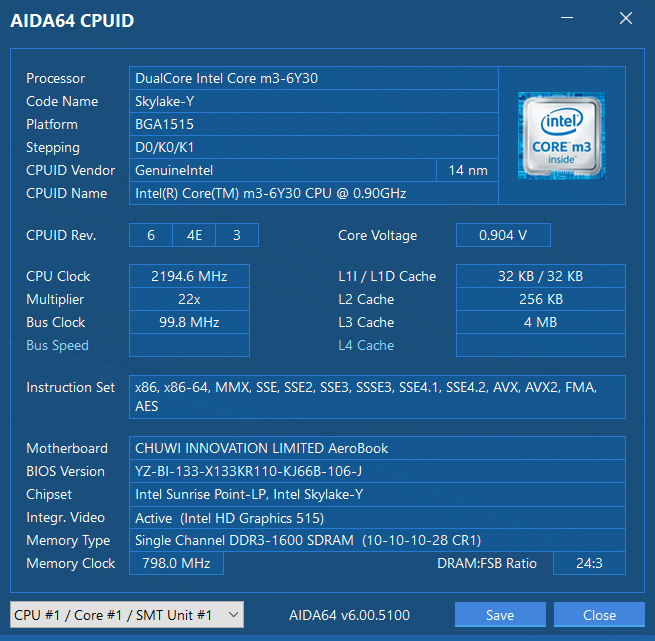








51 Comments
View All Comments
HStewart - Friday, June 21, 2019 - link
I have purchase a Chuwi tablet and would say it was very cheap and I would never purchase one for $500. This uses 2 generations old bottom of line Intel Y processor and very soon to 3 generations old. My guess is that they are trying to monopolize on old hardware.My 3 year old Samsung TabPro S has similar cpu and in better form factor than this - are we sure this was a new computer - but than again Chuwi always used outdated components which to be honest gives a bad name out there.
pjcamp - Friday, June 21, 2019 - link
"Chuwi has often never done well on battery life..."Often never?
PixyMisa - Sunday, June 23, 2019 - link
In this case, yes.Hog54 - Friday, June 21, 2019 - link
Im on a Asus laptop that has a AMD RYZEN 2500u, Nvidia 1050 graphics,8 gig of ram,and a 256 ssd that I paid the same price for 3 months ago.:)Xpl1c1t - Saturday, June 22, 2019 - link
Bought a Huawei Ryzen 2500U Matebook D, $450. Im mainly a desktop user, but this laptop is probably the most functional laptop I've used. Running Plasma Wayland desktop for most taks (still need windows for MATLAB and SPICE). Havent been this convinced that I own a great mobile product since purchasing the Samsung NC20 (Via Nano powered) netbook ages ago and reworking the keyboard to DVORAK to evaluate the claimed benefits (it is better, wish i could rework this keyboard).The level of competition in the low/midrange mobile segment makes me wonder why anyone would mess with premium segment mobile products given the minimal performance gap. Egotism I guess.
HP, Razer, Dell, Apple - I see most college students around me using these products, but cant help shaking my head when considering their markup over price-competitive brands. My experience with HP laptops is that they have fragile glass coverings on their touchscreens, Razer is basically adopting the premium Apple tax mentality which caters to their market segments, Dell products are probably the most durable - though XPS machines are way overpriced. I strongly suspect that, despite the fact that all these machines are not manufactured domestically, that the markup over identically specc'd machines from non-domestic brands is simply buffering the inevitable collapse of their niche domestic markets. The proposition that the domestic engineering of a laptop is significantly superior to non-domestic engineering is no longer legitimate. Guess this is why people want to make america great again?
bji - Saturday, June 22, 2019 - link
I guess no one else is as smart as you huh?Perhaps you should read and understand the selection mechanisms that go into consumer choices. Not everyone wants what you want, and other people value aspects of products that you may not care about. It's kind of obvious if you think about it. Have you actually thought about it? Or are you more comfortable making ego-stroking assumptions?
Sorry I just cannot read another smug Anandtech post about how much smarter the poster is than everyone else with regards to product choices. It is soooo old and increasingly annoying every time it happens.
Xpl1c1t - Sunday, June 23, 2019 - link
I'm not proposing that I am smart, but thank you for educating me about your opinion."The proposition that the domestic engineering of a laptop is significantly superior to non-domestic engineering is no longer legitimate."
That is my proposal. Eat it. What, do you work for HP? Raking in the screen repair bucks? Yeah... guess I cant get my Huawei repaired domestically, but im not concerned about the glass shattering any time soon.
oRAirwolf - Sunday, June 23, 2019 - link
I got one of these off of the IndieGoGo campaign for $429. It's a nice laptop for the money. I agree that the battery is too small.Some complaints:
The screen has a very yellow tint to it. I have tried adjusting the color temp in the Intel control panel, but it's just not great. I ordered a SpyderX Pro and am going to play with it more.
The backlight on the keyboard does not turn on with the laptop. You have to turn it on every time you power on the laptop. It would be really nice if it remembered it's setting.
The backlight on the keyboard does not turn off when you turn off the laptop.
The BIOS is completely unlocked and has options for many features that do not exist. It makes it pretty difficult to make any changes.
Lord of the Bored - Monday, June 24, 2019 - link
"The backlight on the keyboard does not turn off when you turn off the laptop."All I can say to that is: Haha what.
...
How do you mess that up?
Spunjji - Wednesday, June 26, 2019 - link
Agreed, that's pretty damn special!